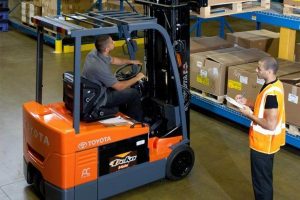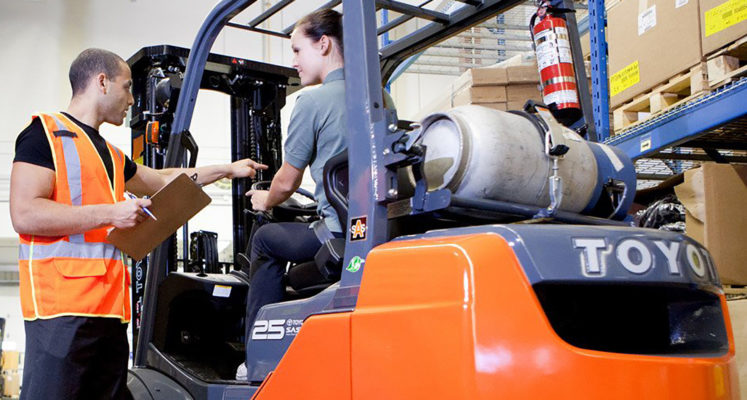5 Things You Don’t Know about Forklift Operator Training
We all know that forklift operator training is required by law. Most of us understand that this makes sense from a safety standpoint, but not as many facility managers understand that it makes just as much sense from a business standpoint. Here are 5 things you (probably) don’t know about forklift operator training that you should know.

Image courtesy of Toyota Forklift – Bahrns ToyotaLift is an award-winning Toyota Forklift Dealership
1) Operator Training is Good for Your Bottom Line
Lift truck operator training programs are often viewed as a necessary burden. Studies have shown, however, that proper training has a number of hidden financial benefits:
• It has been proven that companies that take forklift training and refresher training seriously experience fewer accidents.
• In facilities where respect is not shown for forklift skills, operators take their jobs less seriously. Conversely, in facilities where forklift training (including refresher training) is given, operator morale is given a boost and they take pride in their performance and safety record.
• Retraining when necessary, such as when an operator is assigned to a different class of lift trucks, enables the operator to master new skills faster and work more productively.
2) Veteran Forklift Operators Need Training
When you hire a forklift operator, OSHA still requires that you evaluate their skills, even if they are a veteran operator. Moreover, unless the working environment is nearly identical to their previous working environment, they should be given formal training in specific areas they are not familiar with.
3) All Forklift Operators Must be Periodically Re-evaluated
There are several instances when even veteran lift truck operators will need to be re-evaluated and/or retrained. Re-evaluation and re-certification is required by law every three years. Re-evaluation includes observation of performance as well as a written test or hands-on performance test. If the operator is not up to standard, they must be given refresher training. This makes sense. Like drivers, forklift operators can pick up bad habits over time. Re-evaluation helps correct any of those bad habits.
4) Refresher Training is Mandated by Law
In some cases, refresher training for forklift operators is mandated by law, no matter how experienced an operator may be. Most commonly, refresher training is required when:
• An operator has been observed operating a lift truck in an unsafe manner.
• A forklift operator has been involved in an accident or near-accident.
• An operator has been assigned to a different type or class of lift truck.
• There has been a change in the workplace environment, such as a new racking system.
5) There are Consequences if You Do Not Adhere to OSHA regulations
Sadly, no matter how much sense it makes to make sure lift truck operators are fully trained and operating their vehicles safely, too many facility managers let training slide in the interests of keeping their operators on the floor working. OSHA can’t be everywhere at once, they tell themselves and don’t worry about the possibility of a fine. In fact, OSHA inspects over 40,000 facilities each year and issues fines of up to $7,000 for non-serious offenses to $90,000 or more for serious offenses. Repeat violations get even higher fines — up to $70,000 for non-serious offenders.
Once you’re on OSHA’s radar, you can expect to see their inspectors more frequently. One company cited in an OSHA press release has been inspected 26 times in 10 years and issued 74 citations. That’s no way to do business. A single fine costs more than a refresher course in forklift operator safety. When you add to that the cost of workplace accidents and inefficient lift truck operation, there’s just no excuse not to invest a little time and money into lift truck operator training.

